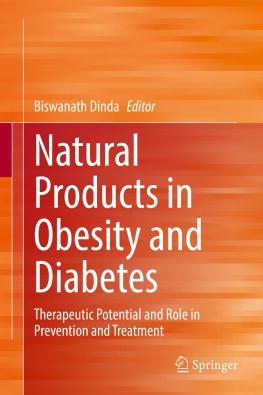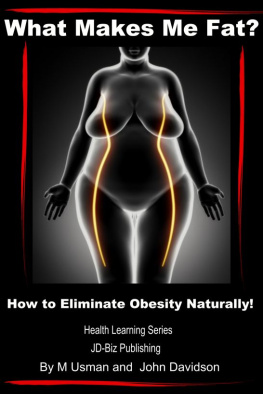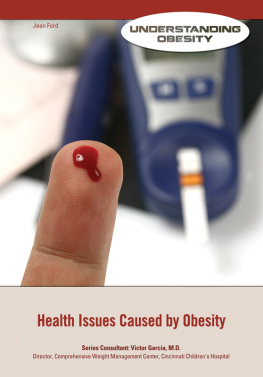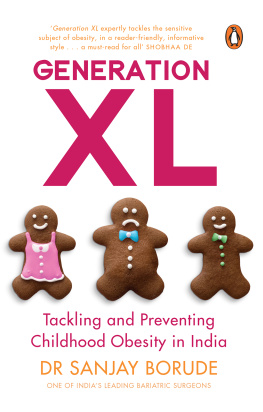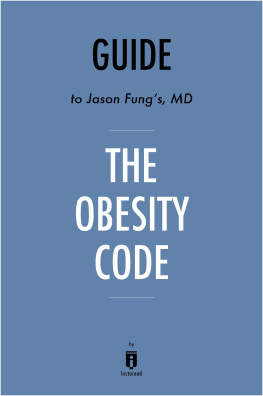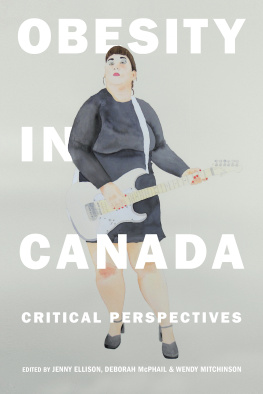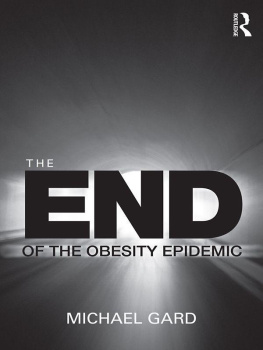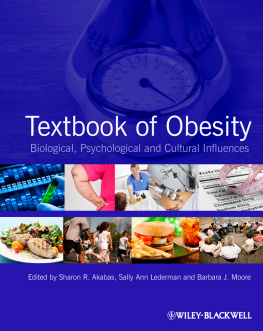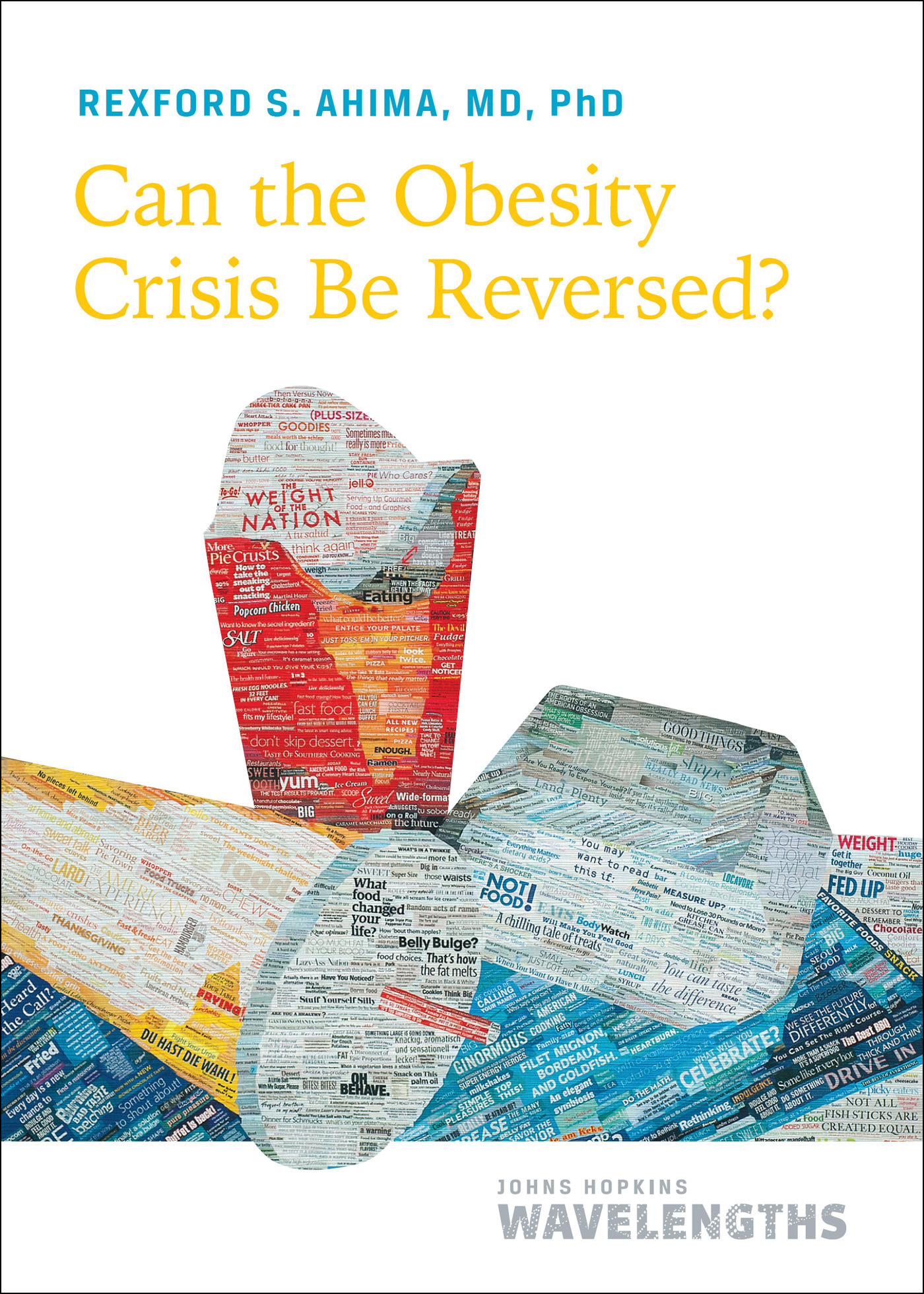Contents
Guide
An intelligent and accessible account of our current understanding of the complex interactions of biology, environment, and socio-economics in the etiology of obesityarguably the most consequential long-term medical issue confronting the United States. Ahimaa widely admired physician-scientisthas studied this problem from many perspectives and is familiar with the broad range of relevant factors and their relationships. He encourages individuals with obesity through an emphasis on the biological basis for these problems and he offers scientific and public policy contexts for their ultimate solution. Such knowledge and awareness constitute important counterforces to persistent inclinations to blame individuals for this condition. Jargon-free and even-handed, the book will be useful to lay individuals as well as students and researchers as an excellent introduction to this very important problem.
Rudolph L. Leibel, MD,
Christopher J. Murphy Memorial Professor of Diabetes Research,
Head, Division of Molecular Genetics, Columbia University
An appealing, easy-to-read, and balanced discussion of the disease of obesity, the drivers that influence it, and what can be done about it. The reader will come away with a much more informed view of obesity and a deeper understanding of the struggle faced by those suffering from it.
Catherine Kotz, PhD, President, The Obesity Society;
Professor, University of Minnesota;
and Associate Director of Research (GRECC),
Minneapolis VA Medical Center
Dr. Ahima provides a rich, descriptive reading experience from the lab to the clinic and finally the food and built environment, shedding light on the complexities of obesity. His experience shines through in this update on treatment approaches and helpful strategies for those dealing with the chronic disease of obesity.
Kelly C. Allison, PhD, Director,
Center for Weight and Eating Disorders,
and Professor, Department of Psychiatry,
Perelman School of Medicine, University of Pennsylvania
Can the Obesity Crisis Be Reversed?

In classrooms, field stations, and laboratories in Baltimore and around the world, the Bloomberg Distinguished Professors of Johns Hopkins University are opening the boundaries of our understanding on many of the worlds most complex challenges. The Johns Hopkins Wavelengths series brings readers inside their stories, presenting the pioneering discoveries and innovations that benefit people in their neighborhoods and across the globe in artificial intelligence, cancer research, food systems, health equity, planetary science, science diplomacy, and other critical areas of study. Through these compelling narratives, their insights will spark conversations from dorm rooms to dining rooms to boardrooms.
This print and digital media program is a partnership between the Johns Hopkins University Press and the Universitys Office of Research. Team members include:
Consultant Editor: Sarah Olson
Senior Acquisitions Editor: Matthew McAdam
Copyeditor: Charles Dibble
Art Director: Martha Sewall
Series Designer: Matthew Cole
Production Supervisor: Jennifer Paulson
Program Manager: Anna Marlis Burgard
JHUP Director and Publisher: Barbara Kline Pope
Office of Research Executive Director for Research: Julie Messersmith
Can the Obesity Crisis Be Reversed?
REXFORD S. AHIMA, MD, PhD

Johns Hopkins University Press
Baltimore
Johns Hopkins Wavelengths is a trademark of the Johns Hopkins University
2021 Johns Hopkins University Press
All rights reserved. Published 2021
Printed in the United States of America on acid-free paper
9 8 7 6 5 4 3 2 1
Johns Hopkins University Press
2715 North Charles Street
Baltimore, Maryland 21218-4363
www.press.jhu.edu
Library of Congress Cataloging-in-Publication Data
Names: Ahima, Rexford S., author.
Title: Can the obesity crisis be reversed? / Rexford S. Ahima, MD, PhD.
Description: Baltimore : Johns Hopkins University Press, 2021. | Series: Johns Hopkins wavelengths | Includes bibliographical references and index.
Identifiers: LCCN 2021012208 | ISBN 9781421442716 (paperback) | ISBN 9781421442723 (ebook) | ISBN 9781421442730 (ebook o)
Subjects: LCSH: Obesity. | ObesityTreatment.
Classification: LCC RC628 .A354 2021 | DDC 362.1963/98dc23
LC record available at https://lccn.loc.gov/2021012208
A catalog record for this book is available from the British Library.
The Open Access edition of this book is licensed under a Creative Commons Attribution-NonCommercial-No Derivatives 4.0 International License: https://creativecommons.org/licenses/by-nc-nd/4.0/.CCBY-NC-ND
Special discounts are available for bulk purchases of this book. For more information, please contact Special Sales at .
Preface
ALTHOUGH IVE SPENT MOST OF MY ADULT LIFE studying and practicing medicine, I fell into the study and treatment of obesity largely through circumstance. I was born and raised in Ghana, West Africa, where the education system is similar to the British system. In secondary (high) school, students are guided into choosing careers in the arts, sciences, or business. I attended the Accra Academy, in the capital city of Accra, where I excelled in the sciences and mathematics as well as music, art, and debatethe last of which probably helped shape my later propensity to question dogma and search for fresh ideas. In addition to speaking several native languages, we were all proficient in English, the national language of Ghana. Moreover, I studied French for three years and German for five years. All of these languages aided my studies and my career.
My mother worked for some years in nursing, which offered insights into the health profession and its impact on society. My father worked as an accountant in the civil service, and I may have gotten my knack for data and good recordkeeping from him. My brother enjoyed sports, which sharpened our competitiveness and provided a mutual escape from the monotony of schoolwork. I have very fond memories of growing up within an extended family in the sunny climate of Accra with its tropical rains, sports (soccer and track), great food, sandy beaches, and other lovely places.
After completing advanced science courses in high school and taking national examinations, I was admitted to the University of Ghana Medical School. The curriculum started with the basic sciencesanatomy, biochemistry, physiology, microbiology, pathology, and pharmacologywhich offered lectures and laboratory work to establish a foundation for subsequent clinical training. I understood the connection between basic science and the illnesses afflicting people, such as infectious diseases, diabetes, heart diseases, and cancer. I did not, however, fully appreciate the importance of scientific research to the practice of medicine. Why did I need to know about research in order to prescribe a drug?
Fortunately, the dean of my medical school, Fred Nii Lomotey Engmann, had a different perspective. He had trained at the University of Cambridge, England, where medical students are required to spend a year focused on research (in what is known as an intercalated BSc degree) as part of their medical education. Professor Engmann decided to train Ghanaian students using the same kind of approach. As a result, he chose four students, myself included, to pursue an intercalated BSc training at the Middlesex Hospital Medical School of the University of London. It was a very successful program; out of my class of 20 students, 15 went on to receive PhDs in biomedical sciences.


